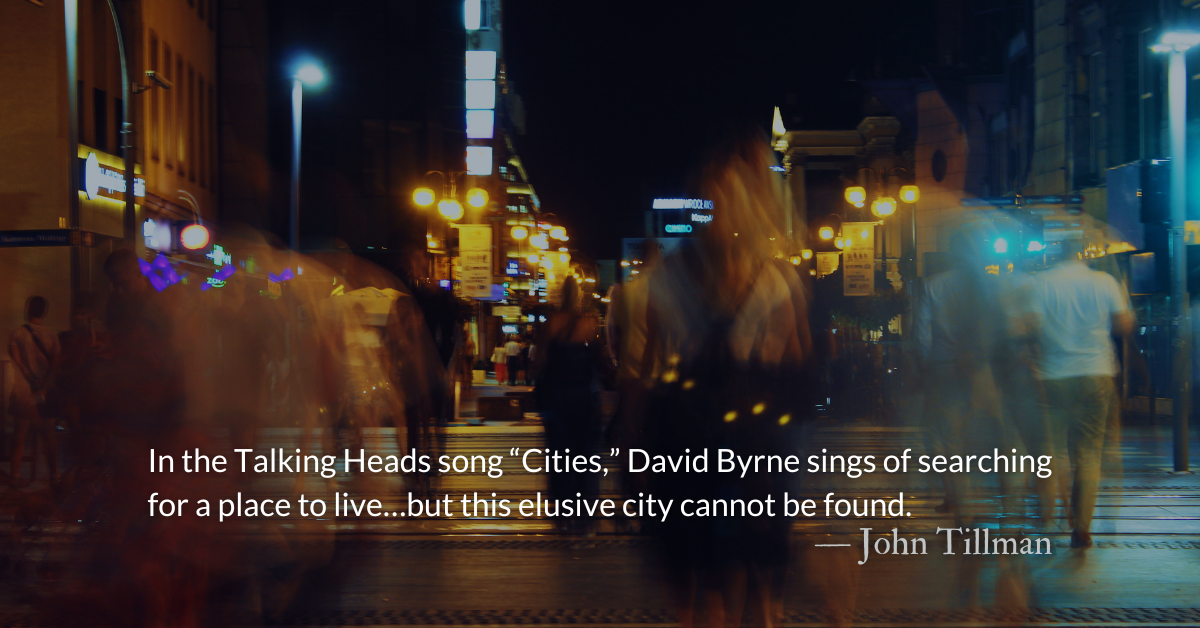Scripture Focus: Psalm 87
1 He has founded his city on the holy mountain.
2 The Lord loves the gates of Zion
more than all the other dwellings of Jacob.
3 Glorious things are said of you,
city of God:
4 “I will record Rahab and Babylon
among those who acknowledge me—
Philistia too, and Tyre, along with Cush—
and will say, ‘This one was born in Zion.’ ”
5 Indeed, of Zion it will be said,
“This one and that one were born in her,
and the Most High himself will establish her.”
6 The Lord will write in the register of the peoples:
“This one was born in Zion.”
7 As they make music they will sing,
“All my fountains are in you.”
Genesis 4.16-17
16 So Cain went out from the Lord’s presence and lived in the land of Nod, east of Eden.
17 Cain made love to his wife, and she became pregnant and gave birth to Enoch. Cain was then building a city, and he named it after his son Enoch.
“I’ll find a city. Find myself a city to live in. Help me. Find a city. Find myself a city to live in.” — David Byrne, Talking Heads, “Cities”
Reflection: A City to Live In
By John Tillman
In the Talking Heads song “Cities,” David Byrne sings of searching for a place to live. He weighs good points and bad points and longs for “home cooking” and a place where the river doesn’t stink. He’s checking them out and trying to figure them out, but this elusive city cannot be found.
Cities have good points. Cities have bad points. Anyone considering a move knows it is difficult to “figure it out.” Anyone who has left a familiar city knows the isolation of feeling like a wanderer.
The condemned, restless wanderer Cain named the first city after his son, Enoch. (Genesis 4.11-17) Cain was cursed and prevented from cultivating the ground, but in Enoch City, other skills were cultivated. From this city came arts and technology. (Genesis 4.21-22) Cast out of Eden’s garden, humans planted cities to protect and provide for themselves, but like other things humans planted, cities were subject to the curse. The cursed ground produced thorns and thistles, and soon, cities bore the fruits of violence, oppression, and evil rather than peace, advancement, or justice.
Most cities in the Bible are mentioned because of evil, not good. From the front pages to the last, the Bible uses the city of Babylon as a symbol of human wickedness. Other cities and empires such as Egypt, Tyre, the cities of the Philistines, and more represent rampant violence and evil.
These cities are covered in darkness. Their rivers stink of death. But there is another city for us.
Psalm 87 names Zion as a city God loves. Zion is another name for Jerusalem, but the city God loves goes beyond a physical location. This city is God’s city. It is founded on holiness rather than sinfulness. It hints at Heaven, described by biblical writers as a city of healing, peace, justice, and mercy, from which the river of life flows.
God loves cities. If they acknowledge God, even wicked cities are spiritually connected to Zion. God writes down Babylon, Rahab (here a nickname for Egypt), and Tyre as “born in Zion.”
Cities have good points. Cities have bad points. But God loves cities and sends us to them. Small ones. Big ones. What are you doing to bring the freshness of the river of life and the aroma of the home-cooked banquet of the gospel to your city?
Video: “The City,” by The Bible Project
Divine Hours Prayer: The Refrain for the Morning Lessons
This is the Lord’s doing, and it is marvelous in our eyes. — Psalm 118.23
– From The Divine Hours: Prayers for Summertime by Phyllis Tickle.
Today’s Readings
Micah 6 (Listen 2:28)
Psalm 86-87 (Listen 2:26)
Read more about The Urban Sprawl of the City of God
Jesus calls us to live within the borderless, wall-less, ever-sprawling city of New Jerusalem.
Read more about Supporting Our Work
May we make our light shine through good deeds, showing God’s mercy and his grace to us, and turning slums and suburbs into cities on a hill.






